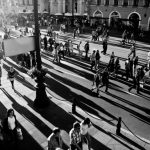For most of us Zimbabwe is a distant African country, caught like so many others between a dark history of colonialism and a present ruled by a tyrannical dictator. For Ben Freeth, author of Mugabe and the White African, it is home. And the atrocities and social injustices suffered under Robert Mugabe’s rule are more than news clips or a source of political conversation. A farmer by trade, Freeth was one of the last holdouts under a racially inspired land reform program that violently stripped white Africans of their farms and handed them to blacks with connections to Mugabe’s ruling party. Freeth is also a committed Christian who believes that the gospel compels him to stand against Mugabe and to fight for the rights of both black and white Africans.
In the process of reviewing Mugabe and the White African, I interviewed Freeth to learn more about how his faith motivated him to fight back, how he led his young family through the violence, and where they go from here.
Can you explain the land reform program?
It is a program started after independence in 1980 that initially involved purchasing 3.6 million hectares from white farmers on a “willing seller, willing buyer” basis. In 2000, two weeks after a referendum that President Mugabe lost, the program became violent with the takeover without any form of compensation of almost all of more than 7,000 title deeds belonging to white people. In large numbers of cases police and other authorities who were in many instances the beneficiaries allowed the looting of crops, livestock, agricultural machinery, and household effects.
The largest numbers of people who suffered were the 2 million black farm workers and their families who were mostly left destitute and homeless. The aim was to disenfranchise them by violently stamping out any political opposition on the farms in the name of land reform. To this end it has been extremely successful.
Given this situation, why do you choose to stay in Zimbabwe?
God calls us to try to be the light in a dark world. If we were to run away from every dark place the dark places would just get darker and bigger. This is our home, and we want to make a difference for the better for the future here.
Do the tensions between black and white Africans invade the church as well?
At the churches we were part of in Chegutu the congregations were mainly black. There is some political pressure on the black people where they are involved in a church with white people in it. But generally the rapport between black and white is very good. Most churches are obviously all black because there are many more black people than white . . . but the tension is not a real one. The tension is manufactured by the people in control to try to bring hatred and division, and we must be on out guards to never allow that to happen.
I have never been a very “denominational” sort of person and have worshiped (and preached) in quite a few different churches. At the moment, we are going to a Baptist church. Formerly I was in the leadership of the Vineyard Church in Chegutu. Prior to that we were part of the Anglican Church until a political appointment [by Mugabe] was made and “Bishop” Kunonga came along and created a terrible situation in that church that is continuing to this day. . . . His persecution of Christians and priests in the diocese has been horrific. (Editor’s note: Kunonga is a rogue Anglican priest and the self-appointed Bishop of Zimbabwe. He is a close ally to Mugabe and has used his position to among other things, strip churches of their property.)
How do you teach faith to your children amidst the injustice and violence you live with?
When there is no law or protection through the law, there is still God. He has sustained us through everything, and as a family our faith is far stronger now than when the violence first started. I was always taught by father that life isn’t fair. He was right. But ultimately God’s justice will prevail on Judgment Day, and we count ourselves privileged to know his love for us and to have seen his protection over us through very traumatic times.
Fear is a very mental and spiritual battle. What ideas or passages of Scripture have been especially helpful?
The Psalms are particularly relevant [as well as] the passage from 2 Chronicles 20 about the great invasion from Ammon, Moab, and Mount Seir. . . . The Israelites were very afraid and did not know what to do, and God told them to stand firm and do not be discouraged or afraid but to “have faith and you will be upheld.” In the face of the attack, they started to praise God, for “his love endures forever.”
Do you think a white man can ever truly be considered an African?
Can a white man be considered American? Can a black man be considered American? Many white African families have been in Africa for centuries. My father in law’s family will have been here 300 years in two years’ time. If they are not Africans, what are they? Among the black power elite, though, white people can not be African, even though they are happy for black people in America to be called Americans.
Speaking of your father in law, did Mike Campbell share your faith?
Yes. He knew what it was to be saved, and on his deathbed he was even able to find forgiveness for those that had taken everything he ever worked for—-as well as taken his health and ultimately his life.
How has your life changed since being forced off Mt. Carmel? You obviously aren’t farming at this point, so what have you been devoting your time and energy to?
We now live in what many ex-farmers call “The Harare Bubble,” and things are very different here, because it is such a world apart from the rest of the reality of the countryside where we have come from. My current vocation is helping the farm workers who have suffered so terribly and who haven’t got a voice or any real power to help themselves.
How would you suggest that the international Christian community help you and support the fight for basic human rights in Zimbabwe?
The first thing Christians need to do is pray for peace and protection over those in the front line in Zimbabwe, and then actively get involved in supporting those on the front line trying to seek peace and justice. This may involve lobbying their governments to bring more pressure to bear, trying to get international organization to assist, sending Christian missions into Zimbabwe, or supporting Christians who are making a difference within Zimbabwe.
We are starting the “Mike Campbell Foundation,” which is a charity based in the UK to try to deal with the very real rule of law and human rights issues facing us in Zimbabwe. So long as these fundamental issues are not dealt with, development will continue to be held back and people will continue to be kept in bondage, hunger, and poverty with the Western nations continuing to bail us out.




































